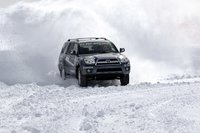For Under $30, You Can Drive More Safely This Winter
 |
MetLife Auto & HomeŽ Provides Seven Low-Cost Tips and a Free Driving-Safety Guide
WARWICK, RI - January 21, 2010: The simple, everyday act of driving is dangerous any time of year, with more than 5.5 million accidents in the U.S. in 2008 alone, resulting in 34,000 deaths. The winter months can be even more treacherous, presenting a host of additional hazards - rain, fog, snow, ice, and sleet - that make winter driving more challenging, especially in the northern U.S. While drivers can't control the weather to make for smoother travels, they can take extra precautions as the winter settles in to be best prepared to endure winter driving challenges.
"Just a few small precautions can make a big difference when trying to navigate cold and wet roads," said Rick Ward, director of auto claims at MetLife Auto & Home. "For very little money, you can help ensure easier and safer travels this winter. During these economic times, it's good to know that there are things that don't cost much, but could ultimately help you avoid a costly accident this winter."
For less than $30, drivers can stock up on necessities to get through the winter and prepare their cars for the onslaught of cold evenings, icy or foggy roads, and blinding snow conditions.
Make sure your car is ready to withstand the cold truths of winter weather.
-- Cold weather can cut the life of a battery in half. Buy a battery
tester for less than $1, and check the health of your battery to make
sure you won't be left stranded out in the cold.
-- With temperatures sure to dip below freezing in many states, drivers
should check to see if their antifreeze is at the recommended 50/50
ratio of antifreeze to water to protect your car's cooling system from
freezing. Buy an antifreeze tester for less than $2.
Optimize your car's performance for winter driving.
-- Properly inflated tires guarantee the best possible contact with the
road, giving drivers more control and protecting against damage from
potholes. Check your air pressure to make sure it matches your tires'
guidelines - especially to account for decreasing air pressure as the
temperature drops. Many gas stations will give you free air when you
purchase gas.
-- With winter storms creating rainy, snowy, icy, and freezing
conditions, windshield wipers that work improperly can severely reduce
your visibility and put you at risk for an accident. If your wipers
are leaving a streak across the windshield, it is time to invest in a
new pair. You can purchase winterized wiper-blade refills that are
designed to prevent ice and snow build-up for around $7.
-- In addition to having properly working wipers, make sure your
windshield washer fluid is topped off, and always carry an extra
gallon, which you can purchase for about $2. Spray from salted and
sanded roads can make it practically impossible to see.
Always be prepared for the worst. Put together a safety and comfort kit to make sure you can weather the storm.
-- A few items can mean all the difference in getting back on the road
safely. Purchase an ice scraper and de-icer for about $2 to break up
any ice that might be obstructing your vision or clogging your locks.
If your car is stuck in snow or ice, have a folding snow shovel
(around $7) and a bag of cat litter (around $2) handy to dig yourself
out and provide traction for your tires on the slippery surface.
-- If all else fails and you are stranded in your car until rescue comes,
be prepared with a comfort kit. Most of the things you need can be
found in your house for free, such as old blankets, hats, and gloves.
In addition to these tips, MetLife Auto & Home offers drivers a free guide called "In the Driver's Seat: About Driving Safety," which provides useful information from the National Safety Council, the National Highway Traffic Safety Administration, and the Insurance Information Institute, to help people drive safely. This guide is available by calling 1-800-638-5433 (MET-LIFE).


